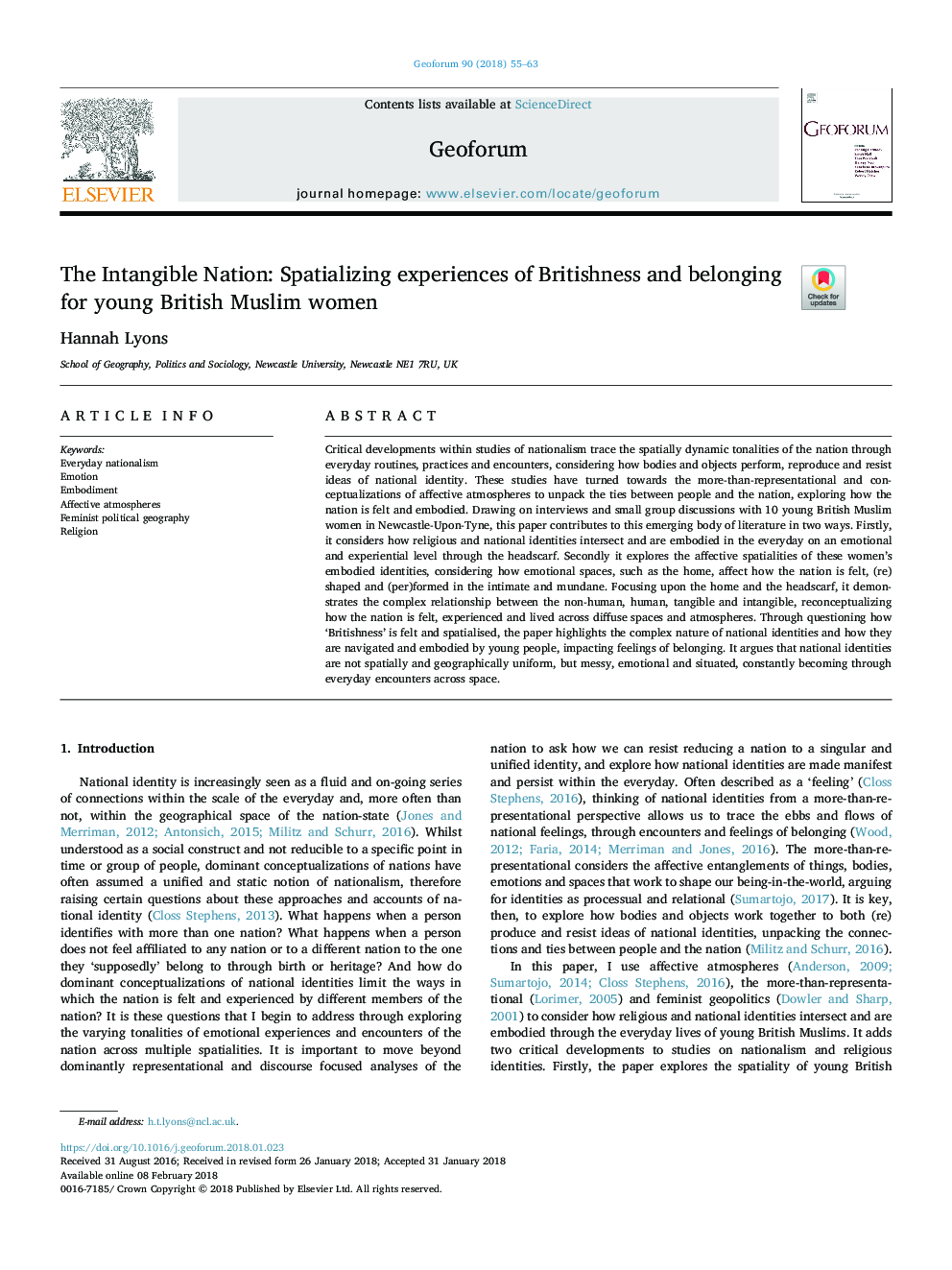| کد مقاله | کد نشریه | سال انتشار | مقاله انگلیسی | نسخه تمام متن |
|---|---|---|---|---|
| 7353720 | 1477099 | 2018 | 9 صفحه PDF | دانلود رایگان |
عنوان انگلیسی مقاله ISI
The Intangible Nation: Spatializing experiences of Britishness and belonging for young British Muslim women
ترجمه فارسی عنوان
ملت غیراسلامی: تجربیات فانتزی بریتیشنس و متعلق به زنان مسلمان جوان بریتانیا
دانلود مقاله + سفارش ترجمه
دانلود مقاله ISI انگلیسی
رایگان برای ایرانیان
کلمات کلیدی
ناسیونالیسم روزمره، هیجانی، تجسم، اتم های مضر، جغرافیای سیاسی فمینیست، دین،
ترجمه چکیده
تحولات انتقادی در مطالعات ناسیونالیسم، تنوع فضایی دنیای ملت را از طریق روال ها، شیوه ها و برخورد های روزمره، با توجه به اینکه چگونه اجسام و اشیاء، تولید، تکثیر و مقاومت در برابر ایده های هویت ملی را تشخیص می دهند، ردیابی می کنند. این مطالعات نسبت به نمایندگان بیشتر و مفهوم سازی جوهای عاطفی به منظور کشف روابط بین مردم و ملت، بررسی می کند که چگونه احساس و تجسم کشور را در بر می گیرد. این مقاله به مصاحبه ها و بحث های کوچک گروهی با 10 زن مسلمان جوان بریتانیایی در نیوکاسلپون تین می پردازد، این مقاله به دو بخش از این ادبیات در حال ظهور کمک می کند. در ابتدا، آن را در نظر می گیرد که چگونه هویت های مذهبی و ملی از طریق روسری تقریبا هر روز در سطح عاطفی و تجربه ای تجسم می یابد. دوم اینکه، فضاهای عاطفی این هویت های تجسمی زن را بررسی می کند، در نظر گرفتن اینکه چگونه فضاهای احساسی، مانند خانه، تاثیر می گذارد که چگونه احساس می شود، (دوباره) شکل و (درون) شکل می گیرد در روحیه و روان. تمرکز بر روی خانه و روسری، آن را نشان می دهد رابطه پیچیده بین غیر انسانی، انسان، ملموس و نامحسوس، تصحیح ادراک چگونه احساس، تجربه و زندگی در سراسر فضای و فضای پراکنده است. از طریق پرسش از چگونگی احساس برتری و فضایی بودن این مقاله، ماهیت پیچیده هویت های ملی و نحوه حرکت آنها توسط جوانان و تأثیر آن بر احساسات متعلق است. این استدلال می کند که هویت های ملی از لحاظ فضایی و جغرافیایی یکنواخت نیستند، اما کثیف، عاطفی و مرسوم هستند، که دائما با مواجه شدن با هر روز در فضا مواجه می شوند.
موضوعات مرتبط
علوم انسانی و اجتماعی
اقتصاد، اقتصادسنجی و امور مالی
اقتصاد و اقتصادسنجی
چکیده انگلیسی
Critical developments within studies of nationalism trace the spatially dynamic tonalities of the nation through everyday routines, practices and encounters, considering how bodies and objects perform, reproduce and resist ideas of national identity. These studies have turned towards the more-than-representational and conceptualizations of affective atmospheres to unpack the ties between people and the nation, exploring how the nation is felt and embodied. Drawing on interviews and small group discussions with 10 young British Muslim women in Newcastle-Upon-Tyne, this paper contributes to this emerging body of literature in two ways. Firstly, it considers how religious and national identities intersect and are embodied in the everyday on an emotional and experiential level through the headscarf. Secondly it explores the affective spatialities of these women's embodied identities, considering how emotional spaces, such as the home, affect how the nation is felt, (re)shaped and (per)formed in the intimate and mundane. Focusing upon the home and the headscarf, it demonstrates the complex relationship between the non-human, human, tangible and intangible, reconceptualizing how the nation is felt, experienced and lived across diffuse spaces and atmospheres. Through questioning how 'Britishness' is felt and spatialised, the paper highlights the complex nature of national identities and how they are navigated and embodied by young people, impacting feelings of belonging. It argues that national identities are not spatially and geographically uniform, but messy, emotional and situated, constantly becoming through everyday encounters across space.
ناشر
Database: Elsevier - ScienceDirect (ساینس دایرکت)
Journal: Geoforum - Volume 90, March 2018, Pages 55-63
Journal: Geoforum - Volume 90, March 2018, Pages 55-63
نویسندگان
Hannah Lyons,
